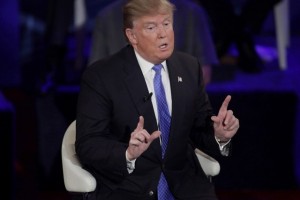Trump’s radioactive discourse
Donald Trump has not provided many so-called learning moments during his raucous campaign to become the Republican Party’s nominee for US president. However, we owe him a debt for forcing attention on an urgent subject that is little discussed: the case for the elimination of nuclear weapons.
That Trump, who has often displayed a dangerously laissez-faire approach to nuclear proliferation, stands any chance of being elected president is a strong argument for a nuclear-free world.
Consider this. Trump has said that as president he would not rule out using nuclear weapons in the Middle East and Europe because “I would never take any of my cards off the table”.
He has suggested going nuclear in the fight against terrorists because “somebody hits us within (the Islamic State) ISIS, you wouldn’t fight back with a nuke?”
And he has said that a nuclear-capable Saudi Arabia, Japan and South Korea were inevitable, perhaps even desirable. With his overly hyped businessman’s eye on profit, Trump has said it may be best for US allies to get their own nukes unless they agree to pay handsomely for shelter under the American nuclear umbrella.
Coincidentally, Trump said these things in a week rich in reference to nuclear threats.
In Washington, US President Barack Obama was at his fourth (and last) Nuclear Security Summit. The good news was ratification of a key global treaty to tighten protections against nuclear theft and smuggling. The bad news was the fear that terrorist groups such as ISIS may be setting their sights on nuclear sabotage or a dirty bomb. After the March Brussels attacks, investigators found surveillance footage of a senior Belgian nuclear official in the apartment of a suspected militant.
And finally, Trump’s proposals for an unregulated nuclear world order came in a week of repeated provocations from North Korea, which recently released a video of nuking Washington.
Trump or not, there is merit in rethinking the realities of nuclear proliferation in the real world.
Nuclear weapons are the final option sought by both rogue regimes and terrorist groups. The original elite nuclear-weapons club — the United States, Britain, France, China and Russia — has been unable to control proliferation.
So is proliferation inevitable? Has it already happened? Set aside pacifist Japan and nuclear-disinclined South Korea for a moment. What about Saudi Arabia? Is it, as Trump suggests, “only a question of time” before Riyadh acquires nuclear weapons?
It is no secret that Saudi Arabia and Pakistan have enjoyed a mutually beneficial relationship for decades. Islamabad has received billions of dollars in subsidised oil and David Owen, who was UK foreign secretary in the 1970s, once suggested that the agreed trade-off probably revolved around nuclear warheads.
“Nuclear weapons programmes are extremely expensive and there’s no question that a lot of the funding of Pakistan’s nuclear weapons programme was provided by Saudi Arabia,” Owen was quoted by the Sunday Times as saying in May 2015. “Given their close relations and close military links, it’s long been assumed that if the Saudis wanted, they would call in a commitment, moral or otherwise, for Pakistan to supply them immediately with nuclear warheads.”
There are indications of renewed Saudi interest in a muscular nationalism and, possibly, a nuclear deterrent. The Salman doctrine, named for the king who ascended to the throne 14 months ago, has been marked by a willingness to commit Saudi military and allied forces to more frequent action in the region, a determination to push back against Iran’s alleged mischief-making and a new resolve to pursue its own interests — regardless of American approval.
In January, Saudi Foreign Minister Adel al-Jubeir refused to scotch suspicions that Riyadh was trying to buy nuclear weapons from Pakistan, insisting that his country would “do whatever it takes in order to protect our nation and our people from any harm”.
He added: “Saudi Arabia is committed to two things. I always say two things we do not negotiate over: our faith and our security.”
This comes at the same time as US Secretary of State John Kerry’s warning of “all kinds of NPT [Non- Proliferation Treaty] consequences” if Saudi Arabia bought nuclear weapons “and Saudi Arabia knows, I believe, that that is not going to make them safe”.
But then Kerry was probably not listening to Russian Prime Minister Dmitry Medvedev’s dark hints in late 2015. Medvedev reported informally hearing from leaders “within the framework of the League of Arab States” that they feared that “anything can happen in the region.” Many countries, including Saudi Arabia, “are seriously thinking” about creating their own nuclear bomb “after a series of events, including those in North Africa, the Middle East”, he told Time magazine.
This may or may not be true and it is certainly vague enough to cover a range of postures. What’s clear is that any recent Saudi exploration of the nuclear option is not solely, as Trump says, because of the deal between Iran and six major powers. The Obama administration has long maintained that sanctions relief for Tehran in exchange for rollback and verification is sufficient to check Iran’s nuclear weapons ambitions. And yet Trump declares “Iran will have it within ten years”.
There is little reason to believe him. To date, Trump has not offered meaningful commentary on any of the most complex policy issues of the day. He has not explained the outrageous positions he has adopted on some of the world’s most pressing problems.
What to do about ISIS, seriously? It is not enough to say he’ll “bomb the s—t” out of the extremist group. How best to work with a Russia that once again wants to be seen as a great power, especially in the Middle East? It’s not enough to compliment Vladimir Putin on being “strong”.
On nuclear issues too, Trump can be said to be merely disruptive. Unfortunately, his standing as the Republican front runner makes his careless words radioactive.


